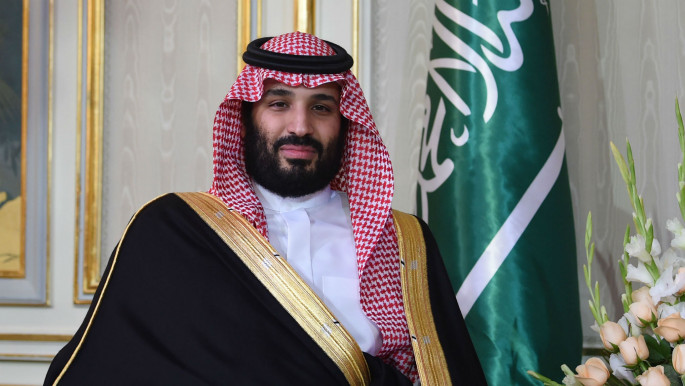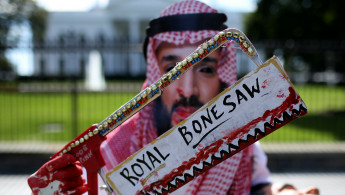Saudi Arabia's plan to silence Khashoggi has backfired. It will forever haunt the kingdom
MbS, once cast as a reformer ahead of his time, has of late earned a reputation in Western capitals as a machiavellian operator often surprised by the consequences of his domestic and foreign policies. The backlash to Khashoggi's murder offers the best example of this short-sightedness.
Before a strike force of Saudi agents killed Khashoggi on October 2, 2018, the columnist for The Washington Post had been criticising Saudi Arabia and MbS in particular from a position of relative obscurity.
In the opinion of many an analyst and no less than the Central Intelligence Agency, MbS ordered the hit on Khashoggi in the hope of silencing him. On the contrary, Khashoggi's death gave his criticisms a level of publicity that he has never enjoyed in his life.
The Khashoggi affair represents just the most notorious instance of MbS choosing to adopt disproportionate responses to minor threats.
 |
The Khashoggi affair represents just the most notorious instance of MbS choosing to adopt disproportionate responses to minor threats |  |
When MbS came to view a handful of Saudi businessmen as rivals, Saudi authorities detained and tortured them. After Saudi proponents of women's rights questioned the extent of MbS' commitment to their campaign, they found themselves imprisoned and subjected to sexual assault.
The resultant Arab and Western headlines have done more damage to MbS than those activists and businessmen ever could.
In the case of more significant challenges, MbS' heavy-handed tactics have continued to backfire. After the Houthis captured the capital of Yemen in late 2014, he launched a campaign to halt the Houthi advances and reinstall the Yemeni government backed by the United Nations. Five years later, the divisive Saudi intervention has caused thousands of civilian deaths, frayed Saudi Arabia's relationship with the United States, and failed to realise its objectives.
In retrospect, MbS likely would have opted for far different courses of action at home and abroad had he anticipated the repercussions of his domestic and foreign policies.
His failure to foresee the outcry that followed his responses to perceived threats may stem from the successes of Middle Eastern regional powers that have pursued similar agendas while managing to avoid quite the same level of scrutiny.
Like Saudi Arabia, the United Arab Emirates has intervened in conflicts and persecuted dissidents without inviting the outrage that has greeted MbS.
 |
Like Saudi Arabia, the United Arab Emirates has intervened in conflicts and persecuted dissidents without inviting the outrage that has greeted MbS |  |
If Saudi officials had stopped to consider the history of MbS' arch rival Iran, they might have predicted many of the reputational crises now confronting Saudi Arabia. Iran's involvement in conflicts across the Middle East has turned it into a pariah state, and Iranian officials' decades of attempts to murder dissidents abroad have undermined Iran's already-strained ties to Europe. Saudi Arabia's foreign policy mirrors Iran's more than Saudi officials seem to realise.
In the context of the historical opposition to Iran's extraterritorial operations and Iran's hunt for dissidents living in exile in particular, the worldwide backlash to the Saudi-planned assassination of a critic based in Turkey should have come as little surprise to officials in Riyadh.
Nonetheless, Khashoggi's death crystallised the self-inflicted problem that has plagued MbS' domestic and foreign policies since he assumed the throne in all but name: disproportionate responses that create difficulties far harder to navigate than the challenges that he is purporting to address.
 |
|
| Read also: A year after Khashoggi: Clarity but no accountability |
In theory, MbS has achievable, admirable goals: he has expressed support for expanding women's rights, funding renewable energy, opening his country to the international community, and reforming a Saudi economy dependent on fossil fuels.
In practice, however, this rhetoric has seemed hollow. If MbS wanted to cement his once-promising reputation, he might have gained more from soliciting Khashoggi's advice than from demanding his assassination.
As Saudi Arabia becomes more entangled in international crises of its own making, one of the most influential and powerful countries in the Middle East seems little closer to undertaking the kind of introspection likely required for the sustainable success that MbS envisions.
For the time being, Saudi Arabia looks content to maintain its current domestic and foreign policies even as its alliance with the US falters, its economy wavers, and the Yemeni Civil War becomes a ceaseless quagmire for Saudi generals with no apparent plan for victory or withdrawal.
In the grand scheme of MbS' misadventures, Khashoggi's death may appear to have little practical significance. Even so, his passing focused the attention of the international community on Saudi Arabia's flouting of peremptory norms in a way that no other Saudi-fuelled controversy has.
The country's bumbling attempts to explain Khashoggi's assassination also indicate that, for all MbS' ambition, the Saudi crown prince rarely exercises a critical skill: foresight.
The consequences of Khashoggi's death could have taught Saudi Arabia any number of lessons, but, at least for now, Saudi officials have displayed little interest in learning them.
Austin Bodetti studies the intersection of Islam, culture, and politics in Africa and Asia. He has conducted fieldwork in Bosnia, Indonesia, Iraq, Myanmar, Nicaragua, Oman, South Sudan, Thailand, and Uganda. His research has appeared in The Daily Beast, USA Today, Vox, and Wired



